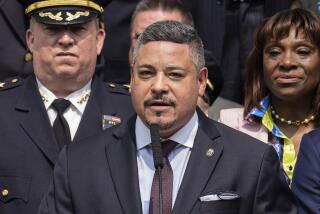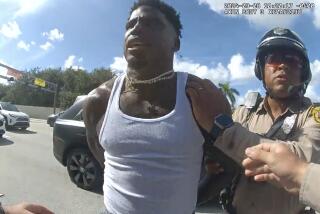Giuliani’s Actions Deepen Rift in New NYPD Controversy
NEW YORK — Patrick Dorismond will be buried Saturday, the third unarmed black man killed by police here in 13 months. But even before his funeral and an expected new round of angry protests, his death has inflamed an already tempestuous debate over allegations of systemic police brutality and misconduct.
And as controversy grows, many New Yorkers seem as troubled by the way GOP Mayor Rudolph W. Giuliani has handled the case as they are about the confrontation itself. It has set off a political firestorm, which some are calling a defining moment in the city’s troubled history of police-minority relations.
Soon after the March 16 shooting, the mayor abandoned any pretense of neutrality by releasing Dorismond’s criminal record. He claimed the off-duty security guard who died in a struggle with plainclothes police was no “altar boy.”
Sparking fury among many police critics, Giuliani next released the dead man’s juvenile record, which is normally sealed, leading to charges that the mayor had broken the law. Finally, he bucked a wave of criticism--even from allies and admirers--by refusing to express any remorse on behalf of the city or to meet with grieving family members. Since the facts of this case are unclear, he said, it would be wrong for him to give the impression that police had acted improperly.
“That Mr. Dorismond has spent a good deal of his life punching people is a fact,” noted Giuliani, adding that “people do act in conformity very often with their prior behavior.”
Now, a growing chorus of New Yorkers is questioning the mayor’s judgment. Many say he has distorted Dorismond’s record: According to police, the 26-year-old man had been arrested several times for robbery, assault, attempted robbery and weapons possession; but all of those charges were either dropped or reduced to disorderly conduct, which is technically a violation, not a felony.
Amid the furor, voices of moderation are calling on all sides to let the Manhattan district attorney’s grand jury investigation proceed. Det. Anthony Vasquez, the officer who shot Dorismond, has temporarily been assigned to desk duty.
“We need to tone down the rhetoric, because things are getting out of hand,” warned Dennis Wolcott, president of the New York Urban League, in an interview. “All of us have to find common ground, including the mayor,” said Wolcott, who has helped develop NYPD community-sensitive training programs.
Tom Repetto, a Giuliani admirer, former police officer and president of New York’s independent Citizens Crime Commission added that “Perception becomes reality and a large number of people in the minority community perceive that there is a problem with the NYPD. We can’t go on this way.”
At a time when the department is facing four separate investigations, including federal probes of its aggressive patrol methods, some are stupefied by the mayor’s actions. Others vow action: Irate minority leaders, led by the Rev. Al Sharpton, are pledging to hold a new round of demonstrations sometime after the funeral at a Roman Catholic church in Flatbush. Those speaking for Dorismond’s family, including his mother, girlfriend and two children, said no political speeches will be allowed at the service.
Adding to the decibel level, Dorismond’s death has become a front and center issue in the already nasty U.S. Senate race between Giuliani and Hillary Rodham Clinton. In her toughest statement of the campaign, Clinton this week excoriated the mayor, saying: “At just the moment when a real leader would have reached out and tried to heal the wounds, he has chosen to [incite] divisiveness.” Firing back, the mayor accused Clinton of reading from a political “script” written by Sharpton.
Previous controversies over police behavior--such as the case of Amadou Diallo, an unarmed street vendor who was killed in a hail of 41 bullets last year--have been largely confined to the city. But the Dorismond case has now spread to Albany, where Democratic State Assembly Speaker Sheldon Silver blasted Giuliani’s release of the dead man’s juvenile crime record as “outrageous” and called for legislative hearings to determine if the mayor broke the law. Giuliani said he did not, noting: “You cannot libel a dead man.”
And the controversy has provoked unusually strong criticism of Giuliani in the local media, even from the arch-conservative New York Post.
“The mayoralty of New York City’s Rudolph Giuliani has hit an all-time low,” editorialized Newsday, which endorsed the mayor when he ran for reelection. “Giuliani’s stance isn’t just lame, isn’t just unfair, isn’t just stupid. It is destructive to the racial comity of the city, to the credibility of the NYPD and to the mayor’s own reputation.”
Amid the uproar, Giuliani has insisted that the public had a right to know Dorismond’s background, as well as that of Vasquez, whose background has also become part of the record. According to police, Vasquez was once disciplined after he failed to promptly report that he had pulled a gun in a Pennsylvania bar fight while he was off duty. He also shot a neighbor’s dog, which he thought was going to attack his son, but was not disciplined for that incident.
The case has cast a harsh light on the NYPD’s “buy and bust” tactics, which are part of the newly launched “Operation Condor.” Under the program, plainclothes officers try to buy drugs from suspected dealers; when a deal is agreed on, other police swoop in to make an arrest. The program has led to more than 21,400 drug arrests this year, a 40% rate of increase over 1999. Police Commissioner Howard Safir has praised the program, saying low-level drug dealers are an incubator of more serious crimes.
Yet such tactics helped precipitate Dorismond’s death. According to police accounts, he was standing outside a bar after midnight in midtown Manhattan, hoping to catch a cab home. Then he was approached by a group of scruffily dressed men, one of whom asked if had marijuana to sell. Dorismond reacted angrily and began struggling with the men, who happened to be New York undercover cops. In the scuffle, he was shot once.
Attorneys for Vasquez claim Dorismond tried to grab an officer’s gun, causing it to go off. But an eyewitness said this week that the men never identified themselves as police and began punching Dorismond. Either way, critics say, he did not deserve to be gunned down, whatever his criminal record. If he talked back to police, they add, it was incumbent on them as professionals to back down and somehow defuse the crisis.
As the debate continues, some observers believe Giuliani is playing to his greatest strength. The mayor’s opponents are “piling on,” said GOP political consultant Joseph Mercurio, “but at some point all this is deeply political and people understand that. Rudy has every reason to defend the police, because their morale is low.”
In many segments of the black community, however, the rage over Giuliani’s actions is palpable. Jill Nelson, a journalist who edited the forthcoming “Anthology of Police Brutality,” said the NYPD’s treatment of minorities has now become a full-blown civil rights controversy. “We’ve seen these shootings before,” she noted. “It’s the same circumstances, with a different corpse. But this time, something has changed. People now see that this mayor is completely over the top.”
More to Read
Sign up for Essential California
The most important California stories and recommendations in your inbox every morning.
You may occasionally receive promotional content from the Los Angeles Times.










